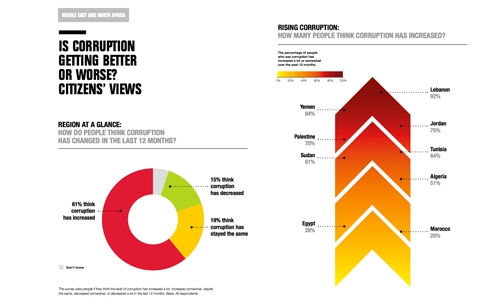Middle East reeling in bribery, reveals survey
Manama : About 50 million people in Middle East and North Africa (MENA) region had to pay a bribe in 2015 to receive basic services, including emergency medical care, according to a report by Transparency International.
“Bribery is a common occurrence in public service delivery in the region, where almost a third of people (30 per cent) who tried to access key public services in the 12 months prior to the survey say that they paid a bribe – or around 50 million adults,” says the survey conducted among 10,797 adults in nine countries and territories in the region.
“The extent of the bribery reported in our survey is a major cause of concern, as widespread corruption is linked to governmental institutions that are inefficient and distrusted. Corruption also leads to an unfair distribution of services and undermines law and order,” it added.
A key worry shared by the survey participants is that 38pc of those who reported a bribery incident suffered retaliation and less than 29pc said authorities took action on reporting bribery.
Also, institutions that are supposed to be the guardians of public welfare and justice are perceived to be the worst offenders among bribe-takers. Courts (31pc) and police (27pc) are perceived to have the highest bribery rate.
Across the MENA region the problem of corruption is widely seen to be on the rise. A majority of people, 61pc, say that they think corruption increased in the 12 months before the survey was conducted. Only 15pc say they think it decreased, while a further 19pc say that they think it stayed the same, according to the survey.
Apart from key public sector functions, the private sector in the MENA is also seen as highly corrupt by many citizens. Two in five people say that business executives are mostly or entirely corrupt. Religious and traditional leaders are considered to be the least affected by corruption in the region, but even so 19pc and 29pc, respectively, say that “Most” or “All” of them are corrupt, Transparency International said in the report.
“The frequency of bribe payments for public medical services is also extremely concerning, with one person in five (20pc) needing to pay a bribe in order to get the services they need. For some people, such a payment might be more than they can afford, meaning that they may not be able to access the vital health services that they need due to corruption.
Bribery is also a fairly common occurrence for those requiring identity documents or permits (23pc), and for those who have contact with household utility services such as electricity and water (17pc).”
Even public schools were not spared from the onslaught of bribery, even though comparatively less, with 13pc of respondents claiming to have paid a bribe.
The report shows that the level of bribery seen in the region is a big human rights problem with many people not being able bear such huge costs to get basic services.
“Many people in the region are still afraid of speaking out against corruption because of fears of reprisals. Only if governments in the region are ready to make a fundamental shift in their mindset to allow for meaningful participation by citizens and civil society in public life, and stop using repression or intimidation against them, will the fight against corruption stand a chance,” urges the report.
Related Posts

